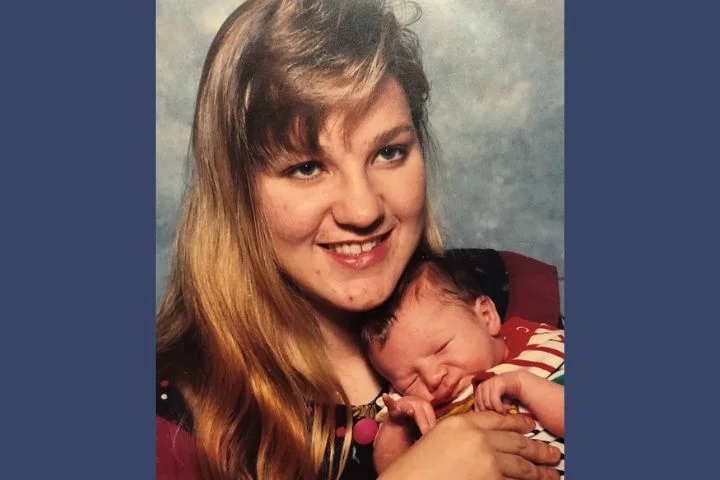Denise Porch was the resident manager of the Yorktown Apartments in Charlotte, North Carolina. On the afternoon of Thursday, July 31, 1975, the 21-year-old left a note for her husband to let him know that she was showing one of the available apartments to a prospective renter. Several witnesses saw Denise in the apartment complex that afternoon, but the last sighting of her was around 3:30 pm. Denise never made it back to her apartment and she was never seen again.
It was around 8:00 pm when Denise’s husband, Dean Porch, got home from work that night. His wife’s 1973 Camaro was parked in its usual spot outside their apartment, but when he arrived at their door, he saw the note Denise had hung up earlier that afternoon when she left to meet with a prospective renter. At first, he thought she must have forgotten to take it down when she got home but when he went inside, he didn’t see any sign of Denise. Both the air conditioner and the television were on but the apartment was empty. Dean noticed that Denise’s purse was sitting on the dining room table, so he knew she hadn’t gone far. He went down to the apartment complex’s model apartment, which doubled as Denise’s office, but it was empty.
Confused, Dean went to the apartment of the complex’s assistant resident manager, Pam Rigg. Pam said she last saw Denise around 3:00 pm; she drove past the complex’s swimming pool in her Camaro accompanied by an unidentified young man. She drove back past the pool about 10 minutes later and waved at Pam as she went by. Pam assumed that she had been showing an apartment to a prospective tenant.
Pam hadn’t seen Denise at all that evening, so Dean checked with several of Denise’s friends. When he realized that no one had spoken to his wife since earlier that day, Dean decided to call the Charlotte Police Department and report his wife missing.
Dean told investigators that the only items that appeared to be missing were Denise’s apartment master keys and a book that contained a list of all the vacant apartments in the complex. This led detectives to believe that Denise had likely been showing someone an apartment around the time she disappeared.
A 27-year-old man who lived in the complex told investigators that he saw Denise around 3:20 pm; she was walking toward a dark, compact car in the parking lot and was accompanied by a middle-aged man. The witness, who was in a hurry as he was running late for an appointment, didn’t get a good look at the man but said that he was a white male with dark hair and was dressed casually. Although he couldn’t recall the make or model of the man’s vehicle, he thought it was navy blue or dark green. He saw the man open the passenger side door and hold it open as if waiting for Denise to get inside, but the witness drove off without seeing if Denise actually got into the car.
About 25 residents of the apartment complex volunteered to help search for Denise late Thursday night, scouring the area for any sign of the missing woman. On Friday, the search was expanded to include several large oil fields near the complex. They found no clues to Denise’s whereabouts. Late on Friday, the Charlotte Police Department issued a nationwide missing person alert for Denise.
Dean was devastated by Denise’s disappearance and found it impossible to sleep. He spent most of Friday sitting next to the phone, hoping that someone would call with good news. “I don’t know what else to do. If I did, I’d do it.” He said that Denise was very level-headed and was always cautious when she was showing apartments to people.
Denise and Dean met when they were teenagers and had celebrated their first wedding anniversary the month before she disappeared. Dean was adamant that Denise would never voluntarily walk away from her life. The two of them hadn’t had any problems in their marriage and Denise seemed to enjoy her job at the apartment complex. “She would never just leave, no matter what kind of pressure she was under.”
The search for Denise continued throughout the weekend but detectives were unable to find any clues to what had happened to her. On Sunday, prompted by a phone call from Dean, the FBI joined the investigation as they believed Denise might have been taken out of state. A spokesperson for the agency said that they would assist the Charlotte Police Department in following up on any leads in another state.
Detectives received a few tips about the case in the days following Denise’s disappearance, but many of them came from self-proclaimed psychics and were too vague to be of any use. One witness called to report seeing a woman being chased by two men on Interstate 77 Thursday afternoon after she had fallen or jumped out of a dark car. This happened about a mile away from the apartment complex where Denise was last seen. Although investigators said they were unable to confirm if the woman had been Denise, the car described by the witness was similar to the one seen by the man at the apartment complex.
Search teams combed through the area surrounding Interstate 77 near where the woman had been seen running but were unable to find anything useful. Investigators also used a helicopter to conduct an aerial search of the region but again came up empty.
Detectives told reporters that they hadn’t found any concrete evidence of foul play but didn’t believe that Denise had left on her own. Although the case was classified as a missing person case, one detective admitted, “We’re putting a hell of a lot more into it than a normal missing person case.”
On Tuesday, detectives were contacted by one of Denise’s neighbors who had been out of town since shortly before Denise was reported missing. The woman, identified only as Mrs. Lucas, told investigators that a man had rung her doorbell around 2:30 pm that Thursday; when she answered the door, he said, “I must have the wrong apartment; the guy I’m looking for must live next door.” Detectives spoke with the man who lived next to Mrs. Lucas but he said he hadn’t had any visitors on Thursday.
Mrs. Lucas said she later saw the same man sitting in front of her apartment in a dark-colored compact car. “The only reason I noticed him was because he was parked where my husband usually parks.” She agreed to work with a sketch artist to come up with a composite sketch of the man, who she said was in his twenties with dark hair and a mustache.
Detectives believed that Denise had most likely been lured out of her apartment building around 3:00 pm by the unidentified man, who probably told her that he was interested in renting an apartment. Shortly after that, she had most likely been abducted. They had no idea what had happened to her after that.
Dean was optimistic that Denise would be found alive but grew increasingly concerned with each passing day. He had received many phone calls from friends and acquaintances who wanted him to know they were thinking about him; he also received one anonymous call that was more ominous. A man had called and said, “I hate to tell you this, but your wife’s dead.” The man hung up before Dean could ask any questions.
A week after Denise was last seen, detectives returned to the Yorktown apartment complex. Armed with composite sketches of the man believed to have abducted Denise, investigators went door-to-door in the 300-apartment complex and showed the sketches to each resident, hoping that someone would recognize him.
After the sketches were published in a local newspaper, a man named Mark Beaver contacted investigators to say he believed he had seen the man at the Yorktown apartments on Thursday. Mark had toured a model apartment with Denise around 3:00 pm, and as they were finishing the tour a man and woman had approached Denise to ask about a vacant apartment. Mark was certain that the man was the person depicted by the sketch.
Mark, as well as two other young men who had been seen speaking with Denise on the day of her disappearance, were extensively questioned by police and voluntarily took — and passed — polygraph examinations. Detectives determined that these men had only interacted with Denise because they were legitimately looking to rent an apartment in the complex and they were ruled out as suspects.
As the search for Denise entered its second week, her mother, Joyce Newsom, made an emotional plea for her daughter’s return. Joyce, the owner of a local jewelry store, told reporters that she would gladly hand over everything she owned if it meant she could get Denise back. “She just doesn’t deserve this.”
Detectives received more than 400 calls from people who thought they had seen Denise after she went missing; they followed up on each potential sighting but were unable to confirm any of them. Hoping to bring in some new tips, local residents started collecting money so they could offer a reward for information leading to Denise’s whereabouts. Ten days into the investigation, the reward fund was at $3,500.
While Denise’s loved ones appealed for her abductor to let her go unharmed, detectives admitted that they didn’t think Denise was still alive. One investigator noted, “She’s being held against her will, if she’s still being held…the general feeling among police is that she’s not able to come back.”
Dean and his mother-in-law told reporters that they had immediately known that Denise was a victim of foul play; she wasn’t the type to go anywhere without letting someone know. Joyce noted, “She was a good girl. She always went to church. And she and Dean thought the world of each other. They have ever since they met at Myrtle Beach six years ago.”
Dean said that since the apartment complex was so big, it was common for Denise to drive prospective tenants to look at a specific apartment. She always used her own car, however; she had a policy of never getting into someone else’s vehicle. He wondered if Denise had met her abductor before. “Maybe the man had come by several times to gain her confidence, enough for her to trust him enough to ride with him a short way.”
Charlotte Police Lt. Wade Stroud was the lead investigator on the case. He was determined to find Denise but admitted that he and his detectives kept running into dead ends. They had interviewed everyone associated with Denise and Dean, spoke with all the residents of the apartment complex, and tracked down 12 people who had recently filled out applications to live at Yorktown. They found nothing linking anyone to Denise’s disappearance.
Lt. Stroud said that more than a dozen people — including Denise’s husband — had taken and passed polygraph examinations about the missing woman. Detectives had been unable to identify any suspects or persons of interest.
A month after Denise was last seen, it was clear the investigation was starting to stall. Dean, who was spending Labor Day weekend at his mother-in-law’s house, told reporters that he called detectives once a day but they never had anything new to report. “It seems like there’s not enough concrete evidence to give them anything to work with…they’re just stabbing in the dark.”
On September 10, 1975, officials announced that Denise’s family had received a number of phone calls and letters stating they could have Denise back for $50,000. With the assistance of the FBI, investigators with the Charlotte Police Department arr*ested Edsel Howard Brown on extortion charges; they told reporters that they were confident he had nothing to do with Denise’s disappearance. He had simply wanted to profit off the family’s misfortune. In November, Edsel pleaded guilty to the charges and was sentenced to serve a decade in federal prison.
By January 1976, there had been no movement on the case and Denise’s family was starting to lose hope that they would ever find out what happened to her. The reward fund had exceeded $7,000 but failed to bring in any solid leads. Lt. Stroud admitted that investigators were baffled. “Everything we’ve done was a shot in the dark.”
In January 1982, Dean filed a petition to have Denise declared legally dead. It had been more than six years since his wife had disappeared, and he told reporters he was finally ready to piece his life back together. In order to settle some property and tax issues, he needed to have the court declare Denise deceased.
Lt. Stroud said that detectives still followed up on the sporadic tips they received about the case, but they were all convinced that Denise had been killed and was likely buried somewhere in Mecklenburg County. “I haven’t any doubt that she’s dead and I haven’t for a long time.”
Joyce, who maintained a close relationship with Dean, agreed that her daughter was most likely dead. She noted that having a court declaration wouldn’t provide any closure for the family; they all still wanted to know what had happened to Denise.
On September 15, 1982, Judge William B. Helms granted Dean’s petition and declared Denise legally dead. Detectives said they would continue their search for Denise and admitted that they had a potential suspect in Denise’s death; the man was currently incarcerated on unrelated charges but there wasn’t enough evidence to indict him for Denise’s mu*rder. Lt. Stroud declined to name the suspect but said he left town the week after Denise went missing and was later arr*ested and convicted of a series of rapes in a nearby city.
In August 1985, investigators announced that they had a new prime suspect in Denise’s abduction and presumed mu*rder: Larry Gene Bell. He had been arr*ested for two m*urders that occurred in South Carolina in May and June 1985. He lived near the Yorktown apartments at the time of Denise’s disappearance but his name had never come up during the investigation.
Although detectives thought it was possible that Larry was responsible for Denise’s abduction, he denied having anything to do with it. Despite several extensive searches of his property, investigators were unable to find any evidence linking him to Denise and he was never charged in her case. He was executed in 1996, taking any knowledge he might have had about Denise’s disappearance to his grave.
Denise’s case has been cold for decades and those who loved her have come to terms with the fact that they will likely never have any closure. Denise’s sister, Diane Hill, said in 2005 that time hadn’t made her loss any easier to deal with. “It’s a mystery…I’d like to know who did it. I’d like to find her body. I’d like for someone to come forward.”
Denise Annette Newsom Porch was just 21 years old when she went missing from Charlotte, North Carolina in July 1975. She and her husband had recently celebrated their first wedding anniversary and were looking forward to a wonderful life together, but their future was stolen from them by someone who has never been identified. Denise has blue eyes and blonde hair, and at the time of her disappearance, she was 5 feet 6 inches tall and weighed 140 pounds. She was last seen wearing slacks and a blue and green silk blouse. If you have any information about Denise, please contact the Charlotte-Mecklenburg Police Department at 704–353–1000.






